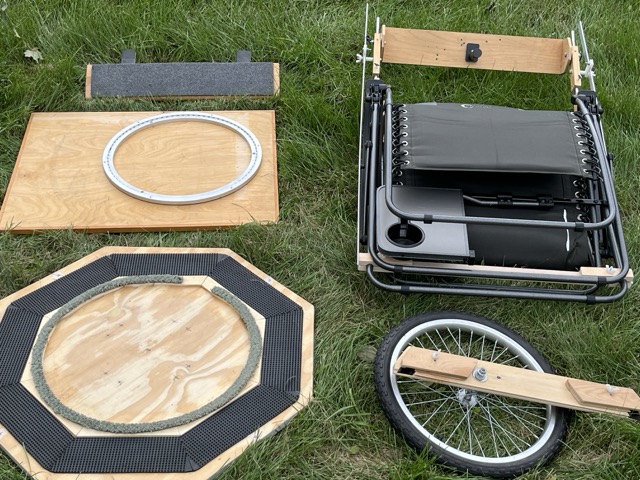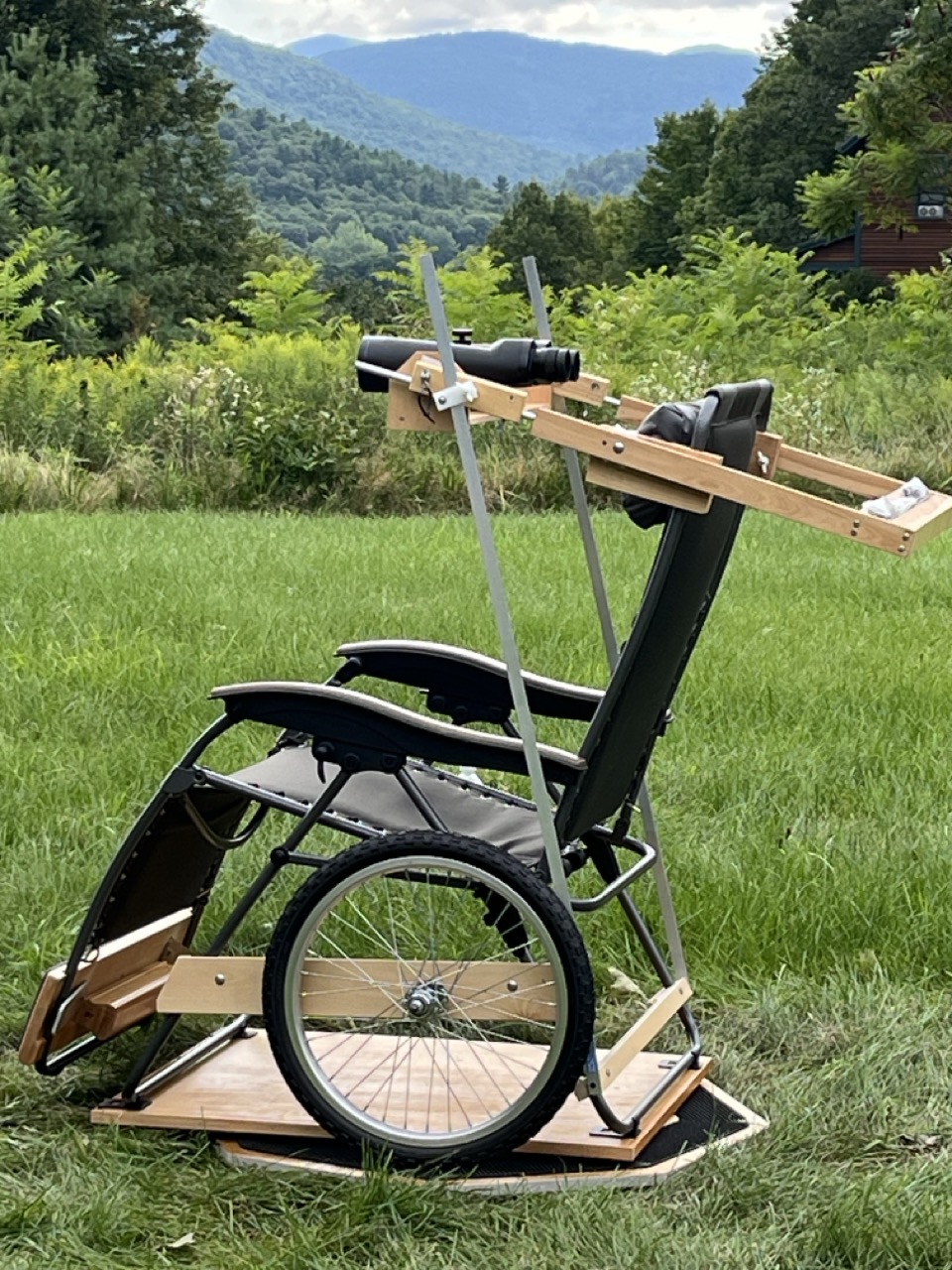This binocular chair has components designed by Milky Way Lounge. Here are the usage and functionality details:
Overview:
| Comfort | Relaxing for head, neck, upper and lower body; a sleep inducer! |
| User height/size | Adjustable for typical user heights and weights, including adults and teenagers. |
| Teeter holder | Fine adjustment of the viewing elevation, with one hand. Used in combination with the cradle described below. |
| Binocular cradle | Used in combination with the teeter described above. With the same hand, fine adjust the eye-to-binocular position. Useful when a large change to the viewing elevation has been made. The cradle fulcrum options can match to the binocular’s center of mass. |
| Chair rotation | Easy smooth azimuth control with one arm while the other arm is controlling elevation. |
| Binocular weight balance | Adjustable with rear counterweights. Doesn’t need to be exactly matched because of added friction. |
| Chair backrest tilt | For coarse elevation changes. A zero gravity chair is best suited but a reclining lawn chair can be used. |
| Chair-front counterweight | Weight-assists when tilting the backrest of the loaded zero-gravity chair, and prevents the chair from tipping over. |
Functionality and stability:
| View direction stability | No drift, due to added friction for both azimuth control and elevation control. Also true when the hands are released, or when the ground is not completely level. |
| View direction bounce-back, after setting the view direction | Almost zero, due to choice of materials. |
| Head/eye positioning to binoculars | The eye distance to the oculars and the angle with the oculars are both completely adjustable. |
| Head/eye position as elevation changes | The eye position tracks the binocular position very well, and can be adjusted for neck cushion thickness and user body size. |
| View settling time | Negligible, due to the stability rods. |
| Elevation drift | Negligible, due to the stability rods. |
| Body pulse vibration aka. “heartbeat”, seen in the view | Greatly reduced by the stability rods, and better in general with a sturdy chair. More noticeable on bright stars at high magnification, and less noticeable on extended objects. |
| Elevation extent | A zero gravity chair typically tilts back to about 75°, then the teeter can tilt the binoculars up to zenith, as the neck is slightly arched. With a cushion on the nape of the neck, this can also be comfortable. |
| Tested with | 10×50’s, 16×70’s, 82mm 20-60x fieldscope |
Easy assembly:
| Sections | 5 to 6 sections. The heaviest and bulkiest section is the zero gravity chair itself. |
| Setup time | A few minutes: stack the base sections, place the chair with its attached binocular holder, slide in the chair front counterweight, and clamp on the wheel mount crossbar using the two nylon wingnuts. This excludes transport time. |
| Collapsible | The zero gravity chair is collapsible with the teeter/cradle and stability rods installed, otherwise easily remove them with the nylon wing nuts. |
| Stacking | The turntable bearing section (see pic below), is flipped over and just sits in the friction cavity of the octagonal base. The chair is opened up with its binocular holder, then placed on the four rubber guides on the platform section (see pic above). The large heavy duty turntable bearing reduces tipping and wobbling. |
| Self-adjustable wheel mount | When clamping on the wheel mount crossbar, it conforms to the geometry of the chair frame, and self-adjusts to the required height off of the base track. |
Body strength to operate chair:
| Arm strength to operate azimuth and the fine elevation controls | little |
| Torso strength to tilt back a zero gravity chair | moderate |
| Leg/arm strength to return a zero gravity chair to upright | moderate |
| Strength needed to transport and assemble the sections | moderate |
Cost and commitment:
| Parts and materials | From recommended external sources; total ~US$300, excluding the zero gravity chair. |
| PDF plans | ~1/4 of the above number; discounts are also available. |
| Tools | Table saw, cross-cut saw, power drill, small belt sander, common hand tools. A router and a drill press are great but there are workarounds shown in the plans. Safety: dust mask, safety glasses, ear protection, ventilation for the finishing. |
| Time commitment | A few days to acquire the parts and to do some organization, then a week or two to build and adjust the components. The plans accommodate your chair dimensions, but expect some trial and error as you fit your new components. |

This work © 2025 by Milky Way Lounge is licensed under CC BY-NC 4.0
Please follow and like us:


Leave a Reply